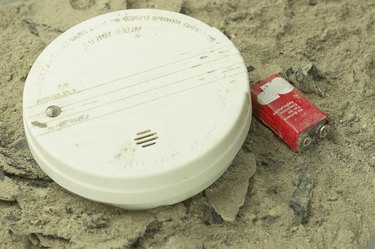
A smoke detector protects your family by informing you of potential fire. The device registers temperature changes and smoke, both of which may indicate a fire. A hard-wired design operates on the power provided by the electrical system in your home, but it has a backup battery for emergency power failures. Hard-wired smoke detectors are far from perfect and might not be the best choice for your home.
Installation Problems
Video of the Day
Don't attempt to install the smoke detector unless you have experience working with electrical systems. According to the United States Fire Administration, qualified electricians should install the smoke detector. The installation process involves cutting into the walls or ceiling of your home and exposing the wires of the electrical system. You must affix the wires from the detector to the existing wires and test the connection. If you miss even a single wire, the smoke detector will not work properly.
Video of the Day
Beeping and Chirping
A smoke detector typically reacts to a potential fire in two ways. The device emits a beeping sound and flashes a red light on the front. Hard-wired designs are more prone to produce false alarms than detectors that run solely on a battery. A rapid increase in temperature, such as running a heater underneath it, might trigger the alarm on a hard-wired smoke detector. Dirt and debris clogging the device can also cause a false alarm. First Alert recommends dusting the alarm and the surrounding area or using a vacuum cleaner attachment around the alarm. According to First Alert, you can spray insect repellent around the outside of the smoke detector to prevent bugs from accumulating in the device and clogging it, although the repellent should not be sprayed directly on the smoke detector.
Power Surges
Hard-wired smoke detectors can experience problems caused by power surges and electrical failure. When you overload your home system and blow a fuse or pop the circuit breaker, you change the way electricity flows through the wiring. The problem can make the smoke detector blink or flash. A power surge caused by lightning hitting a nearby electrical tower or problems with your electric provider might result in similar problems.
Other Issues
A hard-wired smoke detector is not a permanent addition to your home. The device loses its effectiveness within 10 years. You should stay abreast of the U.S. Consumer Product Supply Commission regarding any problems that arise with your specific model. Check with the manufacturer to discover any problems that have been documented, as most keep a list of recalls and safety issues on the official websites. If the manufacturer issues a recall, you should get a free smoke detector from the company.